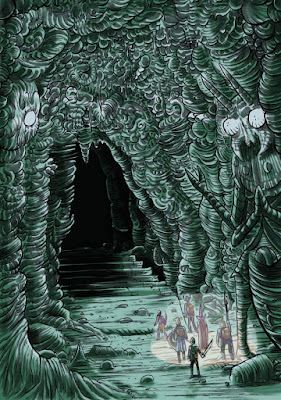This post first appeared in 2013...
"In February of 1981, it became horrifyingly clear the ominous occurrences beneath Centralia were not the result of a coal seam fire. On the night of Valentine's Day, a 4 foot wide sinkhole in a backyard disgorged something more than toxic vapors. The next day, the reports of shocked survivors and the physical remains of creatures unknown to science attested to the stunning fact that humankind had experienced it's first verified encounter with extraterrestrials. Instead of coming down from the stars, they had risen from the subterranean depths.
It was the first, but it would not be the last. Very soon the words 'maze', 'breach", and 'irruption' would take on new, more specialized meanings."
- John Kiehl,
The Abyss Gazes: A History of the Underground Invasion (1995)
"Despite appearances, the mazes are not located within the lithosphere. All evidence suggests they are engineered spacetime features similar in some respects to wormholes. They interface exclusively with subterranean environments, though these may be naturally occurring or man-made. Areas of interface--or breach--are associated with paranormal phenomena.
The interiors of the mazes are generally supportive of earth-like life. Indeed, they show evidence of longterm utilization and habitation by extraterrestrial organisms. Many are still inhabited by extraterrestrial biologic entities who perhaps (like humans) discovered the mazes through breaches on their worlds. Despite the obvious the intelligence of these entities, attempts at communication have been limited due to their hostility. Many appear to regard the mazes and the material culture of uncountable previous explorers and colonists found therein as their property alone.
The tensions around contact with these entities have only been exacerbated by the actions of looters and thrill-seekers illegally entering the mazes, despite the efforts of world governments..."
- UN Report on Extraterrestrial Subterranean Structures and their Inhabitants (1991)
"Q: By whom was the Dulce installation constructed?
A: There are natural caverns, first off. Big ones. Bigger than Carlsbad, even. These caverns have been connected to the mazes since prehistoric times. The Draco [reptilian humanoids] used the caverns and tunnels for thousands of years. The original caverns included ice caves, sulfur springs, and energy 'hotspots' that the ’aliens’ found perfect for their needs. Later, the U.S. government enlarged the area. According to several senior maintenance workers I talked with, part of it was blasted out by nuclear devices in the sixties. There are sections, like the shuttle tunnels, that were formed by an advanced tunneling machine powered by arcane technology that leaves the tunnel walls completely smooth. The walls in those tubes look like polished black glass.
Q: The 1960s? So you're certain the government's awareness of the mazes and aliens didn't just start in the 80s?
A: Absolutely. Every President since Grover Cleveland has had high level talks with aliens from the mazes. Certain secret societies and occult groups, of course, have also been aware of them for a long time."
Q: Was there ever any talk of delvers at Dulce?
A: Both the 'aliens' and the human agents were very aware of them. The government's official line is that the delvers are a nuisance. That was the attitude you got from the human agents working there. The 'aliens', on the other hand, saw the delvers as much more of an affront. What you see in the media is only part of it. There are paramilitary bands--sometimes funded and equipped by so-called 'rogue elements' of various governments. There's basically a covert war going on."
- Transcript from "A Dulce Insider Speaks Out"

























































